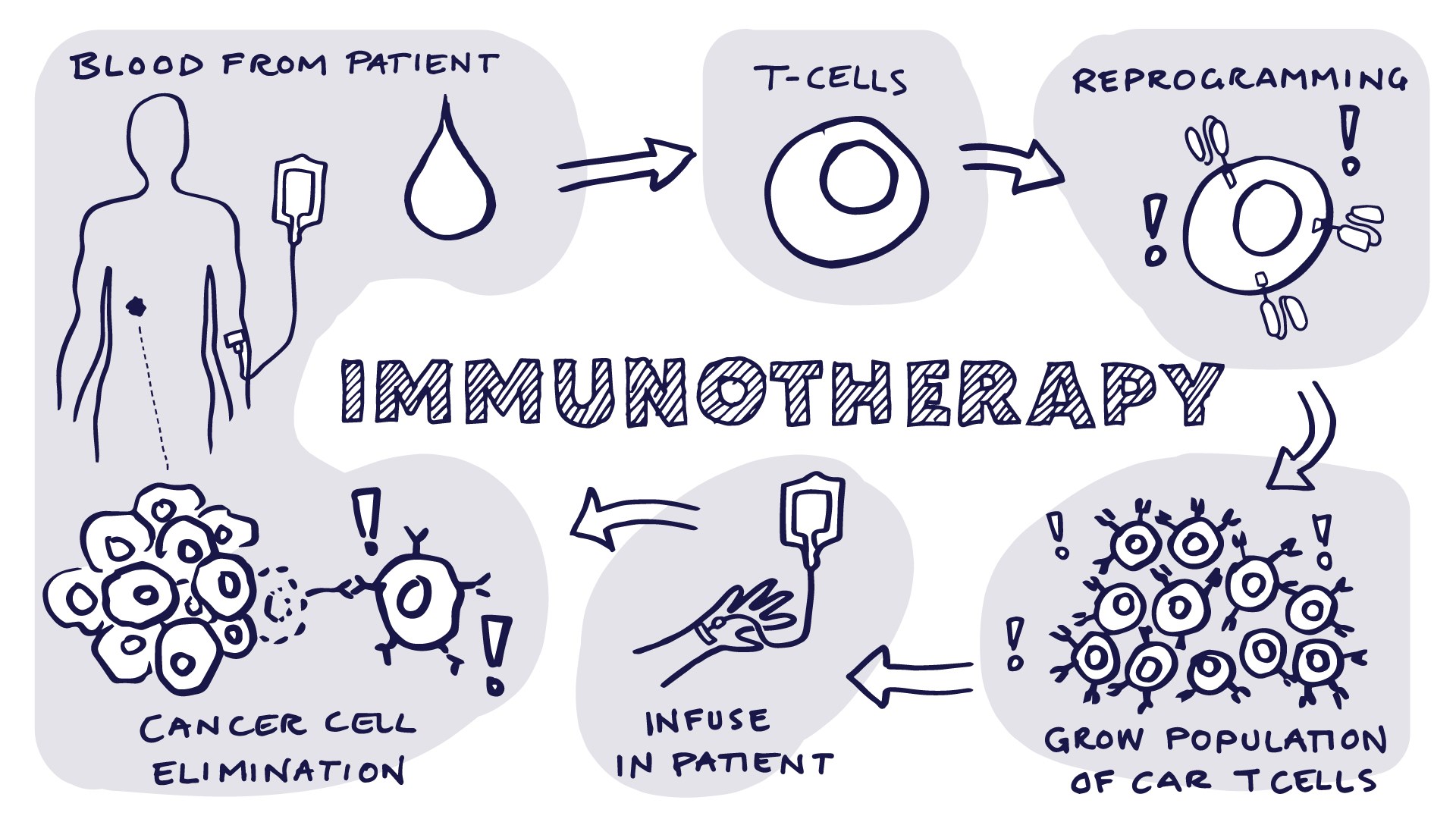
What Is Immunotherapy?
Cancer immunotherapy harnesses your body's immune system to locate and eliminate cancer cells. It encompasses various types of training your immune system to better combat cancer. This treatment holds the potential to extend the lifespan of some individuals with cancer.
Utilizing your body's natural defenses, cancer immunotherapy directs the immune system to recognize and eradicate cancerous cells. By enhancing its capabilities, immunotherapy empowers the immune system to identify and eliminate cancer cells more effectively.
Demonstrating high efficacy, cancer immunotherapy proves to be a valuable treatment, potentially prolonging the lives of individuals with cancer. Ongoing medical research aims to develop new immunotherapy drugs, expanding the range of cancers that can be effectively treated with this innovative approach.
How Does Immunotherapy Work?
Immunotherapy operates on the fundamental understanding of the immune system's role in safeguarding the body against various threats, including allergens, viruses, and potentially cancerous cells. The immune system boasts specialized cells that constantly patrol the body for anomalies. When these vigilant cells identify a damaged or cancerous cell, they initiate a process to eliminate it. This natural surveillance mechanism prevents the rampant growth and dissemination of cancerous tumors.
-
Training the Immune System:
Immunotherapy involves educating the immune system to become more adept at identifying and eliminating cancer cells. This training enhances the immune system's capacity to recognize and respond effectively to cancerous threats.
-
Stimulating Cancer-Fighting Immune Cells:
By leveraging immunotherapy, the body is encouraged to produce specific immune cells designed to target and destroy cancer cells. This process fortifies the body's natural defenses, ensuring a more targeted and robust response against cancerous elements.
What cancers can immunotherapy treat?
Immunotherapy has emerged as a groundbreaking approach in treating various cancers, demonstrating significant success in enhancing the body's natural defenses against cancerous cells. While its efficacy varies across different cancer types, immunotherapy has shown promise in treating several forms of cancer:
-
Melanoma:
Immune checkpoint inhibitors like pembrolizumab and nivolumab have shown success in treating advanced melanoma.
-
Lung Cancer:
Pembrolizumab, atezolizumab, and nivolumab are approved for treating advanced non-small cell lung cancer (NSCLC). Durvalumab and atezolizumab are used for small cell lung cancer (SCLC).
-
Renal Cell Carcinoma (Kidney Cancer):
Pembrolizumab, nivolumab, and ipilimumab are approved for advanced renal cell carcinoma, either alone or with targeted therapies.
-
Bladder Cancer:
Avelumab, atezolizumab, pembrolizumab, and nivolumab are approved for treating advanced or metastatic bladder cancer.
-
Head and Neck Cancers:
Pembrolizumab and nivolumab are used to treat recurrent or metastatic head and neck squamous cell carcinoma.
-
Hodgkin Lymphoma:
Nivolumab and pembrolizumab have demonstrated efficacy in relapsed or refractory Hodgkin lymphoma.
-
Colorectal Cancer:
Pembrolizumab and nivolumab may be used in specific cases of colorectal cancer with particular genetic characteristics.
-
Liver Cancer:
Atezolizumab with bevacizumab, and nivolumab and pembrolizumab, are approved for advanced hepatocellular carcinoma.
-
Gastric (Stomach) Cancer:
Pembrolizumab and nivolumab are used for advanced gastric or gastroesophageal junction cancers.
-
Breast Cancer:
Pembrolizumab has improved outcomes for triple-negative breast cancer patients when given peri-operatively.
Which Kinds of Immunotherapy exist?
Immunotherapy represents a diverse range of innovative treatments designed to harness the body's immune system in the fight against cancer. The main types of immunotherapy include:
-
Checkpoint Inhibitors:
These drugs block certain proteins on cancer cells or immune cells, allowing the immune system to attack cancer cells more effectively. Examples include pembrolizumab, nivolumab, and ipilimumab.
-
Adoptive Cell Therapy (T-Cell Transfer Therapy):
This approach involves extracting T cells from the patient, modifying them to target cancer cells, and reinfusing them into the patient. CAR T-cell therapy is a notable example.
-
Monoclonal Antibodies:
Laboratory-produced molecules mimic the immune system's ability to target specific proteins on cancer cells. Examples include rituximab and trastuzumab.
-
Cancer Vaccines:
Unlike traditional vaccines, cancer vaccines aim to treat existing cancer or prevent its recurrence. Sipuleucel-T is used in certain cases of prostate cancer.
-
Immune System Modulators:
These drugs enhance or suppress the immune system's activity to achieve a therapeutic effect. Examples include interferons and interleukins.
Each type of immunotherapy works through distinct mechanisms, reflecting the intricate ways in which the immune system can be harnessed to combat cancer. The selection of a specific immunotherapy type depends on factors such as the type and stage of cancer, the patient's overall health, and the presence of specific biomarkers.
Google rating score:5.0 of 5, based on 47 reviews
;







